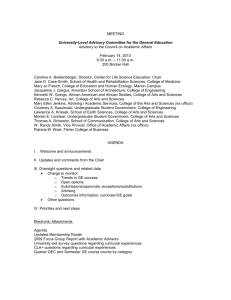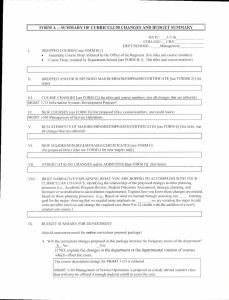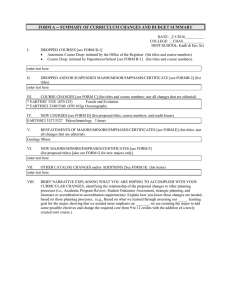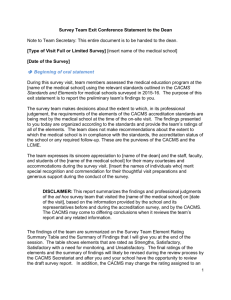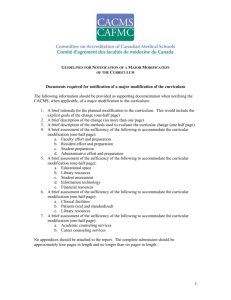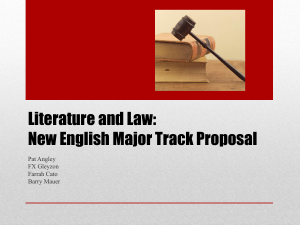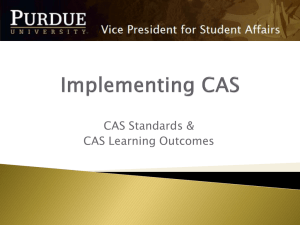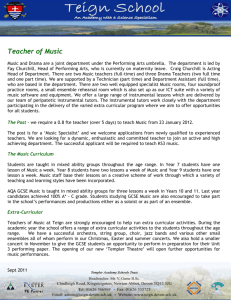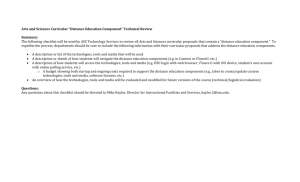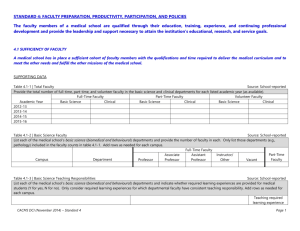Accreditation Standard One
advertisement
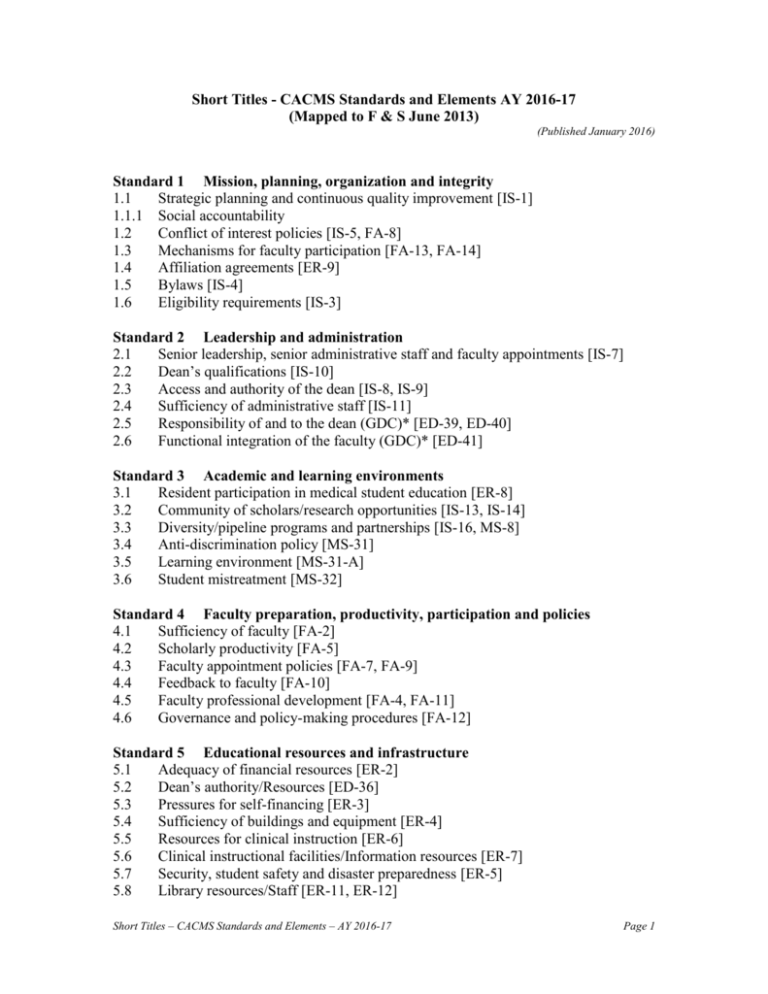
Short Titles - CACMS Standards and Elements AY 2016-17 (Mapped to F & S June 2013) (Published January 2016) Standard 1 Mission, planning, organization and integrity 1.1 Strategic planning and continuous quality improvement [IS-1] 1.1.1 Social accountability 1.2 Conflict of interest policies [IS-5, FA-8] 1.3 Mechanisms for faculty participation [FA-13, FA-14] 1.4 Affiliation agreements [ER-9] 1.5 Bylaws [IS-4] 1.6 Eligibility requirements [IS-3] Standard 2 Leadership and administration 2.1 Senior leadership, senior administrative staff and faculty appointments [IS-7] 2.2 Dean’s qualifications [IS-10] 2.3 Access and authority of the dean [IS-8, IS-9] 2.4 Sufficiency of administrative staff [IS-11] 2.5 Responsibility of and to the dean (GDC)* [ED-39, ED-40] 2.6 Functional integration of the faculty (GDC)* [ED-41] Standard 3 Academic and learning environments 3.1 Resident participation in medical student education [ER-8] 3.2 Community of scholars/research opportunities [IS-13, IS-14] 3.3 Diversity/pipeline programs and partnerships [IS-16, MS-8] 3.4 Anti-discrimination policy [MS-31] 3.5 Learning environment [MS-31-A] 3.6 Student mistreatment [MS-32] Standard 4 Faculty preparation, productivity, participation and policies 4.1 Sufficiency of faculty [FA-2] 4.2 Scholarly productivity [FA-5] 4.3 Faculty appointment policies [FA-7, FA-9] 4.4 Feedback to faculty [FA-10] 4.5 Faculty professional development [FA-4, FA-11] 4.6 Governance and policy-making procedures [FA-12] Standard 5 Educational resources and infrastructure 5.1 Adequacy of financial resources [ER-2] 5.2 Dean’s authority/Resources [ED-36] 5.3 Pressures for self-financing [ER-3] 5.4 Sufficiency of buildings and equipment [ER-4] 5.5 Resources for clinical instruction [ER-6] 5.6 Clinical instructional facilities/Information resources [ER-7] 5.7 Security, student safety and disaster preparedness [ER-5] 5.8 Library resources/Staff [ER-11, ER-12] Short Titles – CACMS Standards and Elements – AY 2016-17 Page 1 5.9 5.10 5.11 5.12 Information technology resources/Staff [ER-13, ER-14] Resources used by transfer/Visiting students [MS-12] Study/lounge/Storage space/Call rooms [MS-37, ER-7] Required notification to the CACMS [ED-9, ER-1] Standard 6 Competencies, curricular objectives and curricular design 6.1 Program and learning objectives [ED-1-A, ED-3] 6.2 Required clinical learning experiences [ED-2] 6.3 Self-directed and life-long learning [ED-5-A] 6.4 Inpatient/Outpatient experiences [ED-16] 6.5 Elective opportunities [ED-18] 6.6 Service-learning [IS-14-A] 6.7 Academic environments [IS-12] 6.8 Education program duration [ED-4] Standard 7 Curricular content 7.1 Biomedical, behavioral, social sciences [ED-10, ED-11] 7.2 Organ systems/Life cycle/Primary care/Prevention/Wellness/Symptoms/Signs/ Differential diagnosis, treatment planning, impact of behavioral/Social factors [ED-10, ED-13, ED-14, ED-15] 7.3 Scientific method/Clinical/Translational research [ED-12, ED-17-A] 7.4 Critical judgment/Problem-solving skills [ED-6] 7.5 Societal problems [ED-20] 7.6 Culture and health care disparities [ED-21, ED-22] 7.7 Medical ethics [ED-23] 7.8 Communication skills [ED-19] 7.9 Interprofessional collaborative skills [ED-19-A] Standard 8 Curricular management, evaluation, and enhancement 8.1 Curricular management [ED-33] 8.2 Use of medical educational program objectives [ED-1] 8.3 Curricular design, review, revision/Content monitoring [ED-34, ED-35, ED-37] 8.4 Program evaluation [ED-46] 8.5 Medical Student feedback [ED-47] 8.6 Monitoring of completion of required clinical learning experiences [ED-2] 8.7 Comparability of education/assessment [ED-8] 8.8 Monitoring time spent in educational and clinical activities [ED-38] Standard 9 Teaching, supervision, assessment, and student and patient safety 9.1 Preparation of resident and non-faculty instructors [ED-24] 9.2 Faculty appointments [ED-25] 9.3 Clinical supervision of medical students [ED-25-A] 9.4 Assessment system [ED-26, ED-27, ED-28] 9.5 Narrative assessment [ED-32] 9.6 Setting standards of achievement [ED-29] 9.7 Timely formative assessment and feedback [ED-30, ED-31] Short Titles – CACMS Standards and Elements – AY 2016-17 Page 2 9.8 9.9 Fair and timely summative assessment [ED-30] Student advancement and appeal process [ED-42, MS-34] Standard 10 Medical student selection, assignment, and progress 10.1 Premedical education/Required coursework [MS-1, MS-2] 10.2 Final authority of admission committee [MS-4, MS-7] 10.3 Policies regarding student selection/Progress and their dissemination [FA-6, MS-3/MS-11, MS-33] 10.4 Characteristics of accepted applicants [MS-5, MS-6] 10.5 Technical standards [MS-9] 10.6 Content of informational materials [MS-10] 10.7 Transfer student qualifications [MS-13, MS-14, MS-15] 10.8 Currently, there is no element 10.8 10.9 Visiting students [MS-16, MS-17] 10.10 Currently, there is no element 10.10 10.11 Student assignment [ED-43] Standard 11 Medical student academic support, career advising, and educational records 11.1 Academic advising [MS-18] 11.2 Career advising [MS-19, FA-6] 11.3 Oversight of extramural electives [MS-20] 11.4 Provision of the medical student performance record [MS-22] 11.5 Confidentiality of student educational records [MS-35] 11.6 Student access to educational records [MS-36] Standard 12 Medical student health services, personal counseling, and financial aid services 12.1 Financial aid/Debt management counseling/Student educational debt [MS-23, MS-24] 12.2 Tuition refund policy [MS-25] 12.3 Personal counseling/Well-being programs [MS-26] 12.4 Student access to health care services [MS-27] 12.5 Non-involvement of providers of student health services in student assessment/Location of student health records [MS-27-A] 12.6 Student access to health and disability insurance [MS-28] 12.7 Immunization requirements and monitoring [MS-29] 12.8 Student exposure policies/procedures [MS-30] *GDC: Applies only to medical schools with geographically distributed programs Short Titles – CACMS Standards and Elements – AY 2016-17 Page 3
